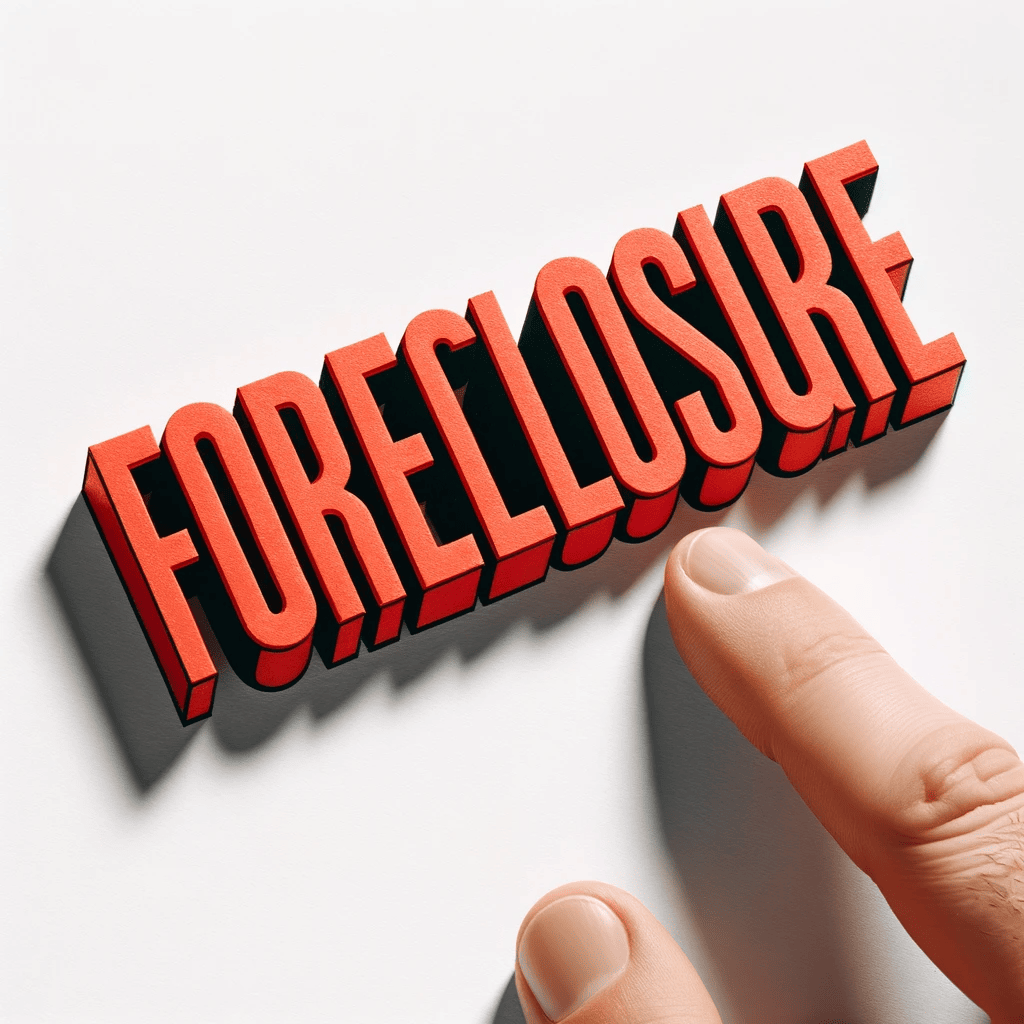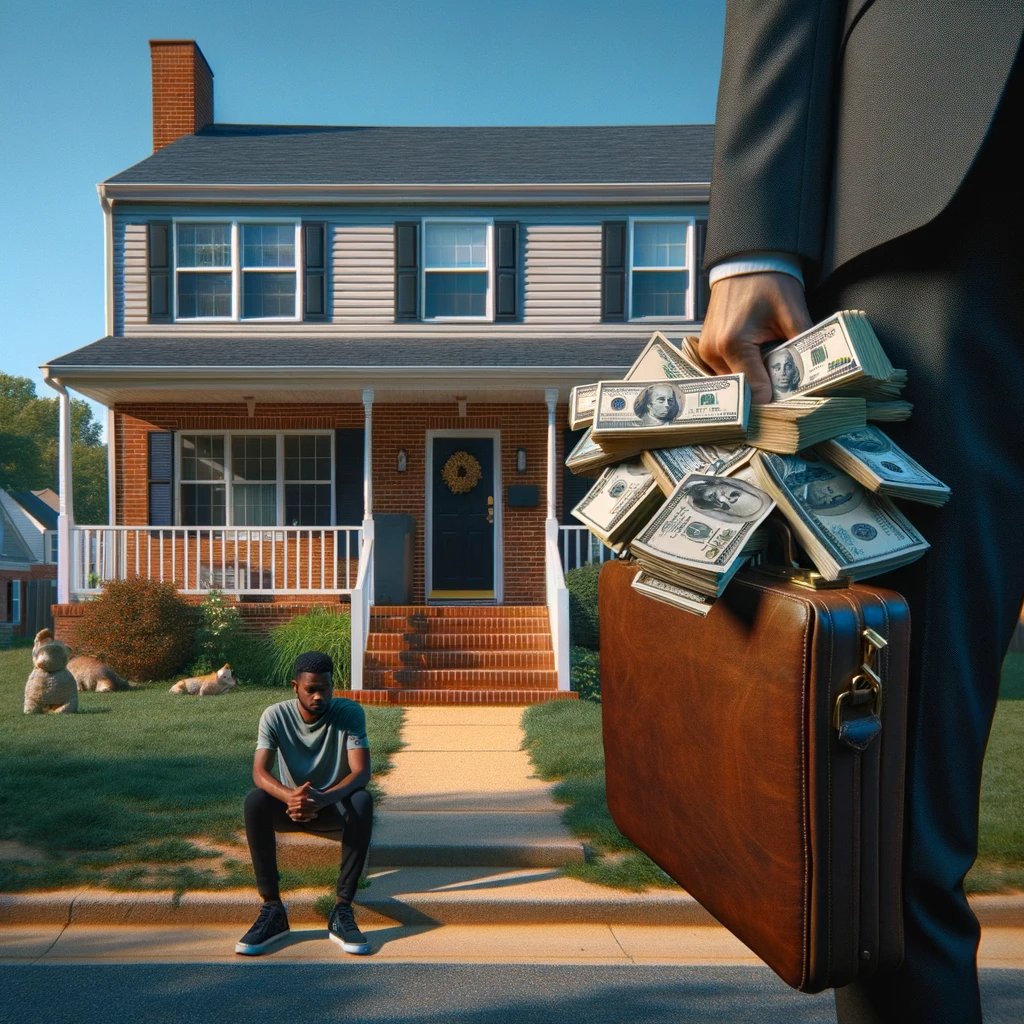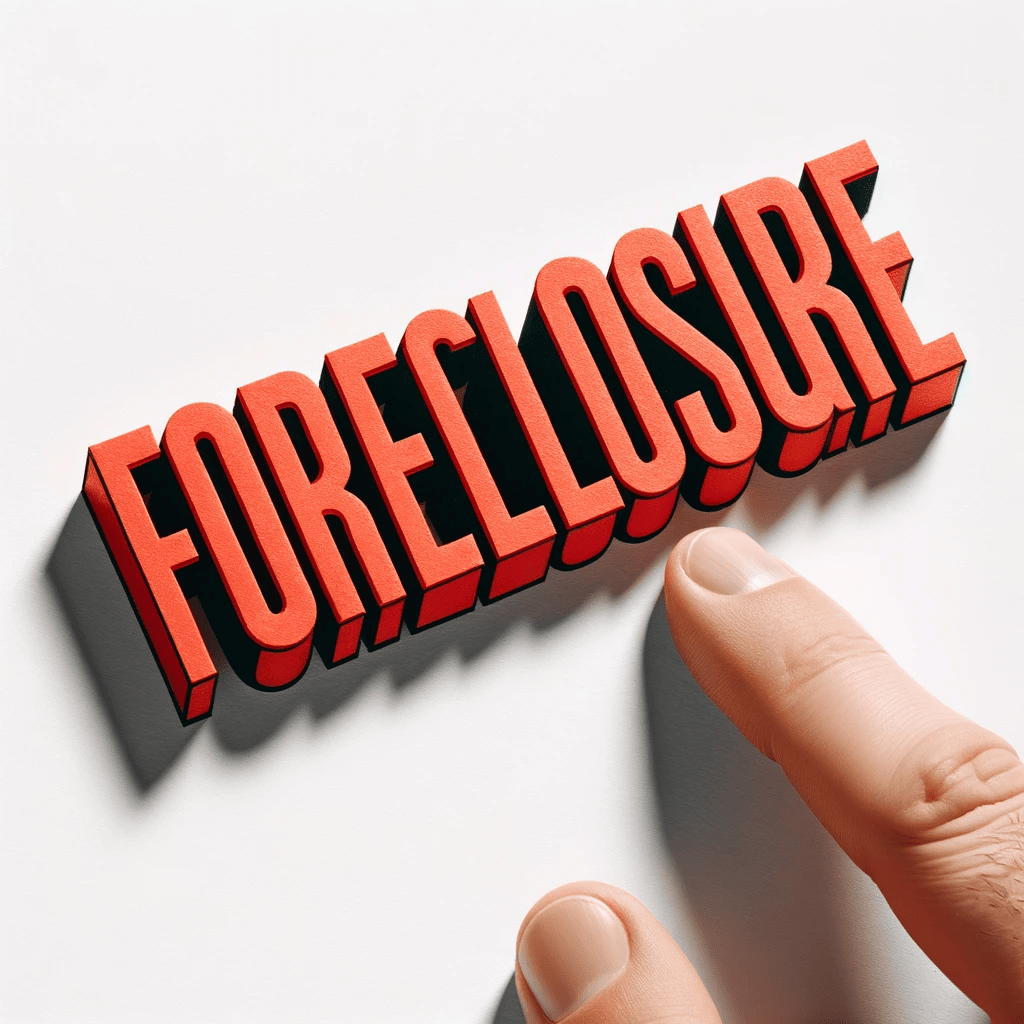
Facing foreclosure can be an overwhelming experience, especially when it’s your home on the line. In Virginia, the foreclosure process has its intricacies, and understanding them is pivotal.
With over 15 years of experience as a Cash Home Buyer in Virginia’s real estate market, I’ve witnessed countless homeowners grapple with this very question.
Yes, you can sell a house in foreclosure in Virginia. Before the property goes to foreclosure auction, you have the option to sell it during the “pre-foreclosure” phase. This period allows you to pay off your mortgage and potentially retain some equity. However, it’s essential to act quickly and consult with professionals to navigate the process effectively.
This article aims to shed light on the foreclosure process in Virginia and emphasize the importance of being well-informed about your choices and making decisions that help you retain your hard-earned equity.
Whether you’re considering selling or seeking alternatives, knowledge is your most valuable asset.
Understanding Foreclosure in Virginia
Foreclosure can be a daunting term for many homeowners. But what does it really mean, especially in Virginia as different states have their own laws and regulations regarding foreclosure?
What is Foreclosure?
Foreclosure is a legal process where a lender attempts to recover the balance of a loan from a borrower who has stopped making payments or has defaulted on his obligations. This is done by forcing the sale of the property used as collateral for the loan.
Types of Foreclosure in Virginia
In Virginia, like many states of the United States, the foreclosure process is both non-judicial and judicial.
1. Deed of Trust Foreclosure (Non-Judicial Foreclosure)
This is the most common type of foreclosure in Virginia. When you take out a mortgage, you sign a deed of trust, which gives the lender the right to sell the property if you default on your loan. The process is initiated when the lender records a notice of default, followed by a notice of sale to the homeowner.
The property is then sold at a public auction. The lender isn’t required to go to court, but they must follow specific procedures, ensuring homeowners are well-informed and given a chance to catch up on their payments.
2. Judicial Foreclosure
While less common, judicial foreclosures can still occur in Virginia. This process involves the lender filing a lawsuit against the borrower. If the court rules in favor of the lender, the property is sold under the court’s supervision through a Sheriff Sale. This method is typically used when there’s no power of sale clause in the mortgage or deed of trust.

When Does Foreclosure Proceedings Start?
In Virginia, foreclosure doesn’t start immediately after a single missed mortgage payment. Lenders typically provide a grace period, allowing homeowners some leeway to catch up. However, if payments continue to be missed, the loan is considered delinquent.
Generally, after about 120 days of non-payment, lenders will send a notice of default.
This notice is a formal indication that the foreclosure process is on the horizon. It’s a crucial juncture for homeowners, signaling the urgency to address the delinquency. Whether it’s through negotiating with the lender, seeking financial counseling, or exploring options like selling during pre-foreclosure, timely action can make a significant difference.
What Happens After Property Is Foreclosed?
Navigating the aftermath of a foreclosure can be a complex journey, filled with questions and uncertainties. What happens to the property? How is it sold? Let’s explore the subsequent steps in Virginia’s foreclosure process.
Once the foreclosure process is complete, the property typically goes to a public sale. This sale can take two primary forms:
1. Sheriff Sale
This is a public auction conducted by the local sheriff’s office. Properties that have been foreclosed upon are sold to the highest bidder. The goal is to recover the amount owed on the defaulted loan.
2. Foreclosure Auction
Similar to a sheriff’s sale, a foreclosure auction involves selling the property to the highest bidder. However, this auction is usually conducted by a trustee or the lender rather than the sheriff.
Virginia’s Legal Stipulations on Foreclosure Sales
According to Virginia Law, specific protocols must be followed for these sales. The law mandates that an advertisement or notice containing information about the sale be mailed to the owner.
This notice should be sent by certified or registered mail at least 60 days, previously which was 14 days, before the sale, as stipulated in the Bill passed by the General Assembly of Virginia.
Additionally, lienholders and associated associations should receive this notice via ordinary mail, no less than 60 days prior to the sale.
This notice serves a dual purpose.
Firstly, it acts as a compliance measure, ensuring all parties are informed. Secondly, it signifies the activation of any acceleration rights contained in the deed of trust or other agreements.
Note: It’s crucial to note that while this notice is a legal requirement, any inadvertent failure to provide it doesn’t impose liability on the trustee or the secured party. However, the foreclosure sale can’t proceed unless there’s proof that the notice has been dispatched.

What is Pre-Foreclosure and Why It Is Important?
Pre-foreclosure is a term that often surfaces in real estate discussions, but what does it truly mean, especially in the context of Virginia’s legal landscape?
Pre-foreclosure is the initial phase that occurs when a homeowner starts to default on their mortgage payment or when the lender issues a letter of default to the borrower before the bank or lender takes back the property.
There is no clear start of a preforeclosure period but a homeowner who is foreseeing a default on mortgage payments is clearly able to establish the pre-foreclosure period.
It’s a critical window of opportunity, a period where homeowners can still take action to potentially halt the foreclosure process.
Now, you might ask, how does pre-foreclosure differ from actual foreclosure?
The primary distinction lies in the stages of the process. While pre-foreclosure begins with the first few missed payments, actual foreclosure is the culmination of consistent non-payment or default on the mortgage obligation in the form of a foreclosure auction, leading to the lender reclaiming and selling the property to recover their losses.
In Virginia, the timeline of pre-foreclosure can vary, both lenders and buyers also try to bargain a solution but typically, after 120 days of missed payments, lenders will initiate the formal foreclosure process and will notify you with notice of sale 60 days before the foreclosure auction.
What are Delinquent Mortgage Payments?
Delinquency in mortgage payments is the primary trigger for the pre-foreclosure phase. But how long do homeowners have before they’re in hot water? Most mortgage agreements have a grace period, usually lasting about 15 days, during which payments can be made without incurring late fees. However, once this period lapses and payments are missed, the loan is considered delinquent.
So, Can You Sell Your House After A Foreclosure?
No, It is important to note that once a foreclosure is completed, the homeowner no longer owns the property, and therefore, cannot sell it. The lender or the entity that bought the property at the foreclosure auction becomes the new owner.
So, you can only sell your property during pre-foreclosure, the window of opportunity before the property is foreclosed by the lender or the bank.

Potential Ways to Sell Your Property in Pre-Foreclosure and to Avoid Foreclosure?
Now, you know that you can work out a solution for your distressed home during a pre-foreclosure and before a foreclosure.
It’s a common misconception that once you’re in the throes of financial difficulty with your home, there’s no way out. But, drawing from my 15 years of experience in Virginia’s real estate market, I can assure you there are avenues to explore.
Let’s discuss the most prominent options distressed homeowners can consider.
1. Deed in Lieu of Foreclosure
A deed in lieu of foreclosure is one of the options for homeowners on the brink of foreclosure.
But what is it?
Essentially, it’s an agreement where you, the homeowner, voluntarily transfer the title of your property to the lender. In exchange, the lender agrees to release you from your mortgage, effectively canceling the loan.
Sounds straightforward, right? But why would a homeowner opt for this, and why would a lender agree?
Here’s the catch: Foreclosures can be time-consuming and expensive for lenders. By accepting a deed in lieu, they can avoid the lengthy and costly foreclosure process. For homeowners, this option can offer a more graceful exit from a challenging situation, potentially causing less damage to their credit than a full-blown foreclosure.
However, it’s essential to approach this option with caution and knowledge.
There are tax implications to consider, and not all lenders will accept a deed in lieu. It’s also crucial to ensure that the agreement releases you from any future liability regarding the property’s mortgage.
2. Short Sale
Transitioning from a deed in lieu of foreclosure, another viable option for homeowners in pre-foreclosure is a short sale.
A short sale in real estate refers to the sale of a property at an asking price that is less than the amount due on the current owner’s mortgage. This typically arises when a homeowner is financially distressed and needs to sell the property before the lender initiates foreclosure proceedings.
In a short sale, all proceeds go directly to the lender.
The lender then has the discretion to either forgive the remaining balance or pursue a deficiency judgment, requiring the former homeowner to pay the difference. It’s noteworthy that in some states, this difference must be forgiven.
Before a short sale can commence, the mortgage lender must give its approval.
This involves the homeowner submitting documentation to justify why a short sale is a feasible solution. The process can be lengthy, often taking up to a year, but it’s generally less detrimental to a homeowner’s credit rating compared to a foreclosure.
3. Selling with a Real Estate Company or an Agent
Next, the idea of selling your property through a real estate company or an agent that many homeowners facing foreclosure go for.
At first glance, this seems like a straightforward solution. After all, these professionals are well-versed in the housing market and can potentially find a buyer for your property.
However, let’s dive a bit deeper.
Selling with an agent often involves hidden commissions that can eat into your profits. While the allure of professional marketing and a vast network is tempting, these services come at a price. Typically, real estate commissions can range from 5% to 6% of the home’s sale price. On a $300,000 home, that’s a whopping $15,000 to $18,000!
But the costs don’t just stop at commissions.
There are also potential fees for staging, professional photography, and other marketing expenses. And remember, time is of the essence in pre-foreclosure situations. With an agent, the sale process can be prolonged. There are property showings to coordinate, open houses to host, and negotiations to handle. Each visit requires meticulous planning, ensuring the house is in tip-top shape for potential buyers. This can be especially taxing if you’re already grappling with financial strain.
Moreover, the uncertainty looms.
There’s no guarantee of when the house will sell. It could be weeks, months, or even longer. And with each passing day, the threat of foreclosure inches closer.
4. Loan Refinancing with Other Banks
Transitioning from traditional real estate options, another avenue some homeowners consider is loan refinancing with other banks.
Refinancing your mortgage essentially means you’re replacing your current mortgage with a new one, hopefully with better terms. This can be a viable option, especially if it leads to a lower interest rate or monthly payment.
However, while refinancing might sound like a silver bullet, it’s not without its challenges, especially for homeowners on the brink of foreclosure.
Refinancing can come with closing costs similar to those of a regular mortgage. These costs can include appraisal fees, credit report fees, title services, and more. For homeowners already facing financial strain, these upfront costs can be burdensome.
Moreover, while refinancing can lower monthly payments, it might extend the life of the loan, meaning you could end up paying more in interest over time. And if you’re considering tapping into your home’s equity, remember that most banks won’t let you cash out more than 70% of the home’s current market value.
Another point to consider is the potential for a slight dip in your credit score due to the hard inquiry lenders make during the refinancing process. For homeowners already facing foreclosure, this could further complicate matters.
5. Selling Your Home On Cash With Cash Home Buying Company
Shifting gears from traditional real estate agents and refinancing home loans, there’s another avenue that’s been gaining traction among homeowners in distress: Cash Home Selling to Cash Home Buying Company.
But what makes this option stand out in the crowded real estate market?
First and foremost, with a reputable cash home buyer, what you see is what you get. There are no hidden fees, no unexpected closing costs, and certainly no commission charges that take a bite out of your proceeds. It’s a transparent process, designed with the homeowner’s best interests in mind.
Moreover, professional cash home-buying companies prioritize communication.
They work hand-in-hand with homeowners, guiding them through the paperwork and ensuring a smooth transition.
And the best part?
They make cash offers after just a single visit. That’s right, no endless property showings, no waiting for buyer financing, and no need to pour money into maintenance or repairs. The property is purchased “as-is.”
However, a word of caution: Not all cash buyers are created equal.
While there are professional companies out there dedicated to fair dealings, there are also smaller cash buyers who might exploit homeowners in vulnerable situations. It’s imperative to do your research and choose a reputable company.
At HR Property Doctor we have helped many.
I recall helping a distressed property owner in Virginia Beach. The owner, Mrs. Thompson reached HR Property Doctor, and was on the brink of foreclosure, overwhelmed with repair costs, and unsure of her next steps. After a single visit, we offered her a fair cash price, handled all the paperwork, and closed the deal within a week. Mrs. Thompson could move forward without the looming threat of foreclosure, grateful for a solution that was both swift and just.

What Happens After Your House Sells in a Foreclosure in Virginia?
Understanding the post-foreclosure process is equally crucial for those whose property is sold or waiting for it to be sold in foreclosure auction.
So, once the gavel comes down and your house is sold in a foreclosure in Virginia, what’s next?
Let’s delve into the repercussions, particularly focusing on the financial implications.
1. Impact on Credit Score and Future Borrowing Capabilities
One of the most immediate and tangible effects of a foreclosure sale is the hit your credit score takes.
A foreclosure can remain on your credit report for up to seven years, and during this period, it can significantly lower your score.
This dip can make it challenging to qualify for new credit, be it credit cards, personal loans, or even a new mortgage.
Moreover, future lenders and creditors will view a foreclosure as a red flag.
It indicates that you’ve had significant difficulties in meeting financial obligations in the past. This perception can lead to higher interest rates on loans, stricter loan terms, or outright loan denials.
However, it’s essential to remember that while the impact is significant, it’s not permanent.
2. Potential for a Deficiency Judgment
Transitioning from the credit implications, another significant aftermath of a foreclosure sale in Virginia is the possibility of a deficiency judgment.
But what exactly does this entail?
A deficiency arises when the foreclosure sale price is less than the outstanding balance on the mortgage. In simpler terms, if your home sells for less than what you owe, the difference is the deficiency.
Now, here’s where it gets tricky.
In some cases, the lender might not just write off this difference. They could potentially take legal action to recover it.
In Virginia, after the foreclosure sale, the lender has the right to file a lawsuit against the former homeowner to obtain a deficiency judgment. If the court grants this judgment, the homeowner is legally obligated to pay the lender the deficiency amount.
For example, if you owed $250,000 on your mortgage and the home sold for $200,000 in a foreclosure sale, the deficiency would be $50,000. If the lender obtains a deficiency judgment, you’d be on the hook for this $50,000.
The implications of a deficiency judgment are profound. It can lead to wage garnishments, bank account levies, or even property liens. Moreover, it adds another layer of financial strain to homeowners already grappling with the aftermath of a foreclosure.

Do You Get Any Money After a Foreclosure?
One common question homeowners often grapple with is whether they receive any money after their house is foreclosed upon.
When a house is foreclosed upon and subsequently sold, the primary aim is to pay off the outstanding mortgage and any associated costs.
If the sale price of the house in foreclosure auction exceeds the amount owed, there might be a surplus. In such cases, the homeowner could potentially receive this excess amount only after all costs and fees for the foreclosure and all subordinate lien holders have been paid and if something is left after all of the mentioned costs.
However, this scenario is relatively rare.
More often than not, the sale price is less than the outstanding mortgage, when additional costs like legal fees, back taxes, and other associated charges are added their is not much money left. In some cases, as mentioned about the lender will file a lawsuit for delinquency payments.
But here’s a crucial point to remember:
If you have any real equity in the house, it’s in your best interest to sell it before it reaches the foreclosure stage. By doing so, you can potentially avoid the negative implications of a foreclosure on your credit score and also ensure you receive any equity you’ve built up in the property.
Can I Redeem My Property Through the Right Of Redemption After a Foreclosure Sale In Virginia?
The Right of Redemption allows homeowners to reclaim their property after a foreclosure sale by paying off the outstanding mortgage balance, along with any associated costs and fees. Essentially, it’s a second chance, a window of opportunity to reverse the foreclosure process and retain ownership of the property.
However, in Virginia, the landscape is a bit different.
Unlike some states that offer a post-sale redemption period, Virginia does not have a statutory right of redemption after the foreclosure sale has taken place.
This means that once the property is sold at a foreclosure auction in Virginia, the sale is typically final. The previous homeowner cannot redeem or reclaim the property.
It’s a stark reality, but it underscores the importance of being proactive.
If you’re facing foreclosure in Virginia, it’s crucial to explore all available options before the sale. Whether it’s negotiating with the lender, seeking legal counsel, or considering a sale, taking action early can make a significant difference.

How Does Bankruptcy Affect Your Mortgage and Foreclosure?
While it’s a word that carries a lot of weight and stigma, in certain situations, it can be a lifeline for few but and may not be favorable for many.
When you file for bankruptcy, an “automatic stay” is put into place. This stay immediately stops most creditors, including your mortgage lender, from pursuing collection activities. This means that if your home is in foreclosure when you file for bankruptcy, the foreclosure process will be halted—at least temporarily.
There are two main types of personal bankruptcy and you should know which one can be good for you.
1. Chapter 7 Bankruptcy: This is known as “liquidation” bankruptcy. In this type, non-exempt assets are sold to repay creditors. In many cases, homes can be exempted, but it’s crucial to understand the specific exemptions in Virginia and Federal exemptions that supplement Virginia State exemptions.
For instance, Virginia allows a homestead exemption, which can protect some or all of your home equity. However, if there’s significant equity in the home that’s not covered by the exemption, the house might be sold to pay off creditors.
2. Chapter 13 Bankruptcy: This is a reorganization bankruptcy designed for debtors with regular income. Instead of selling assets, you’ll create a repayment plan to pay back some or all of your debts over three to five years. This can be particularly useful if you’re behind on your mortgage, as it allows you to spread out the missed payments over the life of the repayment plan. By staying current on the repayment plan and your ongoing mortgage payments, you can avoid foreclosure and keep your home.
The Downside of Bankruptcy
Impact on Credit Score: One of the most significant repercussions of filing for bankruptcy is the severe blow it deals to your credit score. A bankruptcy can remain on your credit report for up to 10 years, making future borrowing challenging and expensive. This long-lasting blemish can hinder your ability to secure loans, credit cards, and sometimes even affect job prospects.
Loss of Assets: In a Chapter 7 bankruptcy, non-exempt assets can be liquidated to repay creditors. While Virginia offers certain exemptions, there’s always a risk of losing valuable assets, including portions of your home equity that exceed the exemption limits.
Long-term Financial Implications: While bankruptcy can provide short-term relief, its long-term financial consequences are profound. Future lenders might view you as a high-risk borrower, leading to higher interest rates and less favorable loan terms.
Not a Guaranteed Solution for Foreclosure: It’s crucial to understand that bankruptcy doesn’t necessarily prevent foreclosure. It can delay it, but if you’re unable to maintain regular mortgage payments post-bankruptcy, the foreclosure process can resume.
Conclusion
Foreclosure is a daunting process that no homeowner wants to face. It’s not just about losing a home; it’s about the erosion of hard-earned home equity, the emotional toll of uprooting one’s life, and the long-term financial implications that can follow. Navigating the complexities of foreclosure in Virginia requires a thorough understanding of the available options and their consequences. While there are several avenues to explore, from loan refinancing to selling home on cash, each comes with its own set of challenges and benefits.
But here’s the silver lining: you don’t have to navigate this journey alone. If you’re facing the threat of foreclosure in Hampton Roads or nearby and believe you might default on your mortgage obligations, there’s help available.
At HR Property Doctor, we’ve dedicated ourselves to assisting homeowners like you. Our Cash Home Buying Solution has been a beacon of hope for numerous homeowners across Virginia.
Whether you’re in Virginia Beach, Chesapeake, Franklin, Hampton, Newport News, Norfolk, Petersburg, Portsmouth, Suffolk, Williamsburg, or Yorktown, we’re here to offer a helping hand. Our extensive experience and deep understanding of the Virginia real estate landscape position us uniquely to provide guidance, support, and practical solutions.
Don’t let foreclosure dictate your future. Reach out to HR Property Doctor today, and let’s explore how we can help you secure a brighter, more stable financial future.
Frequently Asked Questions- FAQs
1. How many notices do you receive before your house is sold in Virginia?
In Virginia, homeowners typically receive two main notices before their house is sold in a foreclosure: a notice of default and a notice of sale. The notice of sale must be sent at least 60 days before the auction date.
2. Does foreclosure in Virginia differ from other states?
Yes, foreclosure laws vary by state. Virginia primarily uses non-judicial foreclosure, meaning the process does not need to go through the court system, and there is no right of redemption after the sale, which is different from some other states.
3. When is it too late to stop foreclosure In Virginia?
In Virginia, it is generally too late to stop a foreclosure once the date of auction is issued or auction has taken place and the property has been sold. Up until the point of sale, homeowners have options such as loan modification, repayment plans, or selling the home to prevent foreclosure. It’s crucial to act quickly and seek advice as soon as you anticipate difficulty in making mortgage payments.
4. What happens if my house sells for less than what I owe in a foreclosure in Virginia?
If your house sells for less than the amount owed, you may be subject to a deficiency judgment, where the lender can pursue you for the remaining balance.
5. How does foreclosure affect my credit score in Virginia?
Foreclosure can significantly impact your credit score, potentially dropping it by 100 points or more, and the foreclosure can remain on your credit report for up to seven years.

